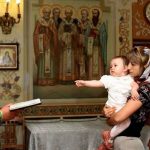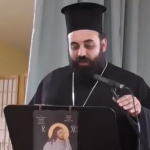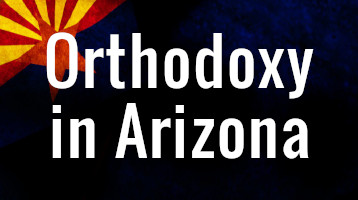The Responsibilities of the Godparent only begin at baptism, the role really expands and hopefully blossoms as the Godparent and Godchild develop a close and loving relationship. As with any relationship, this spiritual one needs to be fostered and cared for in order for it to develop. The best way for this relationship to grow is through prayer. Pray for your Godchild and his or her parents, and the parents should encourage their child to pray for the Godparents. By doing this you are encouraging a relationship and giving it the spiritual basis on which to mature. Here are some practical ideas offered by the Orthodox Church In America website, and Fr. Timothy Sawchak of SS. Peter & … [Read more...]
How Skipping Church Affects Your Children
By Micah Anglo In a church Q&A, Carl Trueman was asked about why churches today are losing their young people. Typical answers to this question range from things like the temptations of this world or the irrelevance of the church—your typical answers. But Trueman makes a keen and convicting connection between our parenting and apostasy. “The church is losing its young people because the parents never taught their children that it was important. I think that applies across the board. It applies to family worship, and it also applies to whether you are in church every Sunday and what priority you demonstrate to your children church has on a Sunday. If the sun shines out and their … [Read more...]
2017 Spiritual Retreat a Success
On Saturday, October 14, the Second Annual Spiritual Retreat of the Palestinian and Jordanian Orthodox Christian Communities in the United States of America on “The Orthodox Family in Crisis” took place in the Sun City of All Saints of North America in Sun City, Arizona. The next day, Sunday, Oct. 15 was the date of a festal Divine Liturgy including the presentation and veneration of the relics of 3 North American Saints - St. Herman of Alaska, St. Tikhon of Moscow, Enlightener of North America, and St. Raphael of Brooklyn. Participation in the Congress surpassed all expectations, and the spiritual retreat received very positive reviews from participants, many of whom came from several … [Read more...]
“Patriarch Tikhon is One of the Greatest Universal Saints”
Patriarch St. Tikhon One of the Greatest Universal Saints by Alexander Filipov A talk with Archpriest Vladimir Vorobiev. In 2015, the Russian Church celebrated two important anniversaries of Holy Patriarch Tikhon: February 1—150 years since his birth, and on April 7—ninety years from the day of his repose. Patriarch Tikhon captained the ship of the Church through the bloody storm of anti-ecclesiastical persecution inspired by the godless leaders of the communist regime, who had seized power in much-suffering Russia. Patriarch Tikhon is one of the most venerated saints of our times. He has three feast days: September 26/October 9 is the day of his canonization, March 25/April 7 is the day … [Read more...]
Spiritual Retreat
The Second Annual Spiritual Retreat is almost here! Sat. Oct. 14- Sun. Oct. 15 "The Orthodox Family in Crisis" is the topic, and even a glance at the news will reveal the importance of this retreat for Christians. Orthodox Christian parents, Godparents, Grandparents, and newly married couples planning on having children will find much worth hearing, and great encouragement. As the world rages against the family, and children in particular, the Church offers answers (not promises), and time tested strategies that work for guiding and protecting your family. Our speakers are: Orthodox Christian parents, Godparents, Grandparents, and newly married couples planning on having children will … [Read more...]
Why You Should Keep Taking Your Kids To Church Even When It Feels Pointless
Every Sunday families face the monumental challenge of getting out the door and to the service on time. In our house the baby always needs something right as it is time to leave. by Emily Carrington After a bottle, a paci, her blanket, and some coaxing, our eight-week-old daughter fell asleep on the way to church. I hoped she would take a morning nap during the service and we would actually focus on worship. Not ten minutes into the service, she filled her diaper. Out went my husband with my daughter. After they returned, she sat calmly for about two minutes before the fussing began again. I took her to the back to calm her down, but nothing worked. I went back to our seat, grabbed my … [Read more...]
Three American Saints of the Iron Range
by Fr. Radomir Plavsic Three Saints on the Range?! From Chisholm, MN!? Believe it or not, our small but rich corner of the American Heartland has, besides its natural beauty and good people, three bona fide saints. These three saints lived on the Range in the 1920s and 1930s. Their names are Sts. Teofan Beatovich, Matej Stiyachich, and Bogolyub Gakovich. All three men were parish priests who served in the Orthodox parish of St. Basil in Chisholm. All three were immigrants from Yugoslavia. Although they lived and worked in America they met a martyr’s end having returned to Yugoslavia during the Second World War. Many of you are not very familiar with what a saint is. Think of them as … [Read more...]
Eucharist: Mystery or Memorial? Sacrament or Symbol?
What is the Lord's Supper? What is the Eucharist? Was it always understood as a Sacrament? Throughout the history of Christianity, the overwhelming majority of Christians have consistently believed that Jesus Christ, in a mystery, imparts His Body and Blood through the Eucharist to His people. Bypassing all the Biblical references, here is a small, non-exhaustive sampling of what they've had to say in every generation. If you're going to read any of them, please read them all. Ignatius of Antioch AD 35-107 "Mark ye those who hold strange doctrines touch the grace of Jesus which came to us, how they are contrary to the mind of God... They abstain from Eucharist and prayer, because they … [Read more...]
2017 Spiritual Retreat: The Orthodox Family in Crisis
A timely topic for anyone concerned about the attacks on the family, particularly Christian families, in the world today. Orthodox Christian parents, Godparents, Grandparents, and newly married couples planning on having children will find much worth hearing, and great encouragement. As the world rages against the family, and children in particular, the Church offers answers (not promises), and time tested strategies that work for guiding and protecting your family. Orthodox Family in Crisis … [Read more...]
The Orthodox Church in America and Its Future
by St. Nikolai Velimirovich I feel greatly honored in being called to speak to you in this great city* on this day, the Sunday of Orthodoxy. For this day is indeed our pan-Orthodox Thanksgiving Day, because on this day for the last thousand years we have been giving thanks to Almighty God for the spiritual victories He granted to the holy Fathers of our Church and, through them, to us. When I mention the Fathers of the Church, I am thinking first of all of the Fathers of the Seven Ecumenical Councils, the first of which was held in A.D. 325 and the last in 787. These Seven Councils represent the seven greatest spiritual battles in the history of Christendom. Like seven pillars of light … [Read more...]











